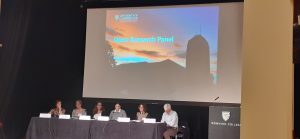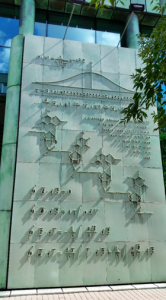In this blog post, Clair Castle, Librarian, University of Cambridge, Department of Chemistry reflects on her experience at the IFLA Satellite Meeting 2017 in Warsaw, Poland.
Earlier this year I was invited by the Office of Scholarly Communication (OSC) at the University of Cambridge to present a paper on Data Curator’s Roles and Responsibilities: International and Interdisciplinary Perspectives. This was my first time writing a paper for a conference and presenting it; it was slightly daunting but exciting too!
 IFLA is the International Federation of Library Associations and Institutions, the international body that represents the interests of library and information services and their users. It celebrates its 90th birthday in 2017. This conference was a pre-Congress Satellite Conference, taking place just before the IFLA World Library and Information Congress held in Wrocław, Poland, from 19–25 August.
IFLA is the International Federation of Library Associations and Institutions, the international body that represents the interests of library and information services and their users. It celebrates its 90th birthday in 2017. This conference was a pre-Congress Satellite Conference, taking place just before the IFLA World Library and Information Congress held in Wrocław, Poland, from 19–25 August.
There were three sessions of four presentations in the programme – which includes links to every presentation. You can find most of the papers that were presented here. The main conference hashtag on Twitter was #wlic2017 (learn more about the 2017 and upcoming 2018 congress by following @iflawic).
Conference focus
Data curation has emerged as a new area of responsibility for researchers, librarians, and information professionals in the digital environment. The huge variety and amount of data that needs to be processed, preserved, and disseminated is creating new roles, responsibilities and challenges for researchers and the library and information professionals who support them. The primary goal of the conference was to engage the international scholarly community in a conversation that led to a better understanding of these challenges, and to discuss the main trends in data curation and Research Data Management (RDM) practices and education.
To ‘curate’ means to ‘take care of’. What resonated with me the most from the conference was the fact that while we are curating data we are curating people as well. We are doing this by changing research culture, evolving the profession, changing research (and research support) practices, doing outreach and advocacy work, and liaising with related university support services. The conference presentations returned to this theme again and again.
I won’t discuss every presentation here, instead I will collate and relate the ideas that I found most thought-provoking.
Intellectual entrepreneurship
This term was introduced to me by Nitecki and Davis’ presentation ‘Expanding librarians’ roles in the research life cycle’. The definition I have since found that explains this the best is from Charles J. Chumas at Stony Brook University:
“Take … the textbook definition of entrepreneur: A person who organizes and manages any enterprise, especially a business, usually with considerable initiative and risk. Now, switch out the words “enterprise” and “business” with words such as “research” or “education”. This is the concept of intellectual entrepreneurship. It is the concept of taking risk, seizing opportunity, discovering and creating knowledge and employing one’s own innovation and strategies, with the ultimate goal of solving problems in corporate, societal or governmental environments. An intellectual entrepreneur … actively seeks out their own education … The philosophy of IE embodies four core values: vision and discovery, ownership and accountability, integrative thinking and action, and collaboration and teamwork”.
I feel that this describes the role of data curators exactly: researchers and the people supporting them are planning data curation strategically and innovatively, acquiring the necessary knowledge and skills to develop it in their institution, and working to bring systems, services and people together to achieve their overall goal of managing data effectively.
Zhang’s presentation ‘Data curators: A glimpse at their roles at the academic libraries in the United States’ mentioned the Association of Research Librarians’ Strategic Thinking and Design Initiative: Extended and Updated Report (2016) which estimates that the research librarian will have shifted from knowledge service provider to collaborative partner within the research ecosystem by 2033. In one example of this, librarians have shifted from providing a service support role to working with researchers to further open science: the FOSTER portal is an e-learning platform that brings together the best training resources addressed to those who need to know more about Open Science, or need to develop strategies and skills for implementing Open Science practices in their daily workflows. It provides training materials for many different users – from early-career researchers, to data managers, librarians, research administrators, and graduate schools. This reflects the self-education aspect of intellectual entrepreneurship.
Upskilling librarians
Many library science curricula around the world do not (yet) include an RDM module. Experienced librarians may not therefore have the necessary knowledge or skills to support RDM. Many data curation post advertisements require leadership, partnership, outreach and collaborative responsibilities but not a professional library qualification. Data curation posts have been repurposed from experienced librarian posts, taken up by new graduates, contractors, PhDs, or sometimes are joint appointments with different academic units. A review of the library profession with regard to RDM skills and knowledge is required to inform future education and training.
Peters’ presentation ‘Reskilling academic librarians for data management services’ highlighted Lewis’ research data management pyramid for libraries (p.16). Areas of early engagement with RDM are situated at the bottom of the pyramid, and as you get to the top you can take on the world!
Role of IT in data curation
Several speakers touched upon this: after all, IT underpins everything and IT support staff are often closer to researchers than librarians are. However, there may be a perception that data curation is not an IT role, per se. In another example of intellectual entrepreneurship, IT and data librarians can work together to provide research data support services: IT can bring UX (User Experience) skills e.g. design of systems, project management, and data librarians can bring their expertise in repository infrastructures, digital preservation, discovery and indexing methods for example.
The definition of data curation is evolving
The IFLA Library Theory and Research Panel Data Curation Project identified the role and responsibilities of data curators in international context. One aspect of the methodology was to undertake a review of literature and vocabulary describing data curation roles (using a cool keyphrase digger tool!), and analysing the content analysis of job advertisements (in 35 countries). They found varying terms to describe data curation (e.g. data stewardship, digital preservation, data science, and RDM, the preferred term). Outreach and advocacy to researchers was found to be an important aspect of roles, which again relates back to the theme of intellectual entrepreneurship.
Central vs. discipline-specific RDM activities at the University of Cambridge
As I have mentioned, I presented my paper on behalf of the OSC. Since its establishment in 2015 the OSC has developed many services to support RDM at the University, including a central website, RDM training and support, and a data repository. It communicates with researchers and support staff including librarians and administrators across the University using a variety of methods. There is therefore a considerable amount of outreach into departments and faculties where research takes place. However, its resources are limited: it is not possible for it to deliver RDM training for example in every department or faculty in the University, especially on a discipline-specific basis.
Most departments and faculties in the University have an embedded library service, which is discipline-specific. Librarians are in a key position to be able to collaborate with the OSC and their own researchers in developing and implementing RDM services locally. My paper presents a case study of how centralised RDM services have been rolled out in the Department of Chemistry, thus adapting the central RDM messages to discipline-specific needs. I describe how customising centralised RDM training to all new graduate students in the Department, being a member of the University’s RDM Project Group, and being involved in the OSC’s Data Champions programme has benefitted both the OSC and the Department.
Identity crisis?
The conference taught me that the identity of data curators is constantly evolving. Does it even matter what we call ourselves? Whatever the term used to describe us, we have similar roles and goals, and need to equip ourselves for future challenges. The concept of intellectual entrepreneurship is worth exploring further as a way of empowering ourselves.
The conference gave me a great opportunity to share and learn about RDM best practice from practitioners across the world. It reinforced for me the fact that we are all in it together, facing the same challenges and working together to come up with solutions.
Observations
 The conference took place at the very impressive University of Warsaw Library, which is centrally located beside the Old Town in Warsaw, right next to the Vistula River. Around 40 delegates attended from all over the world.
The conference took place at the very impressive University of Warsaw Library, which is centrally located beside the Old Town in Warsaw, right next to the Vistula River. Around 40 delegates attended from all over the world.
Warsaw itself is a lively city, though with a rich, if at times tragic, history. After the conference dinner (a BBQ outside on a very warm evening!) we were treated to an entertaining evening bus tour around the city. We passed the amazing POLIN Museum of the History of Polish Jews, travelled through the area where the Warsaw Ghetto had been, and took in examples of communist era architecture (in particular the imposing Palace of Culture and Science).
Published 15 December 2017
Written by Clair Castle – @chemlibcam




